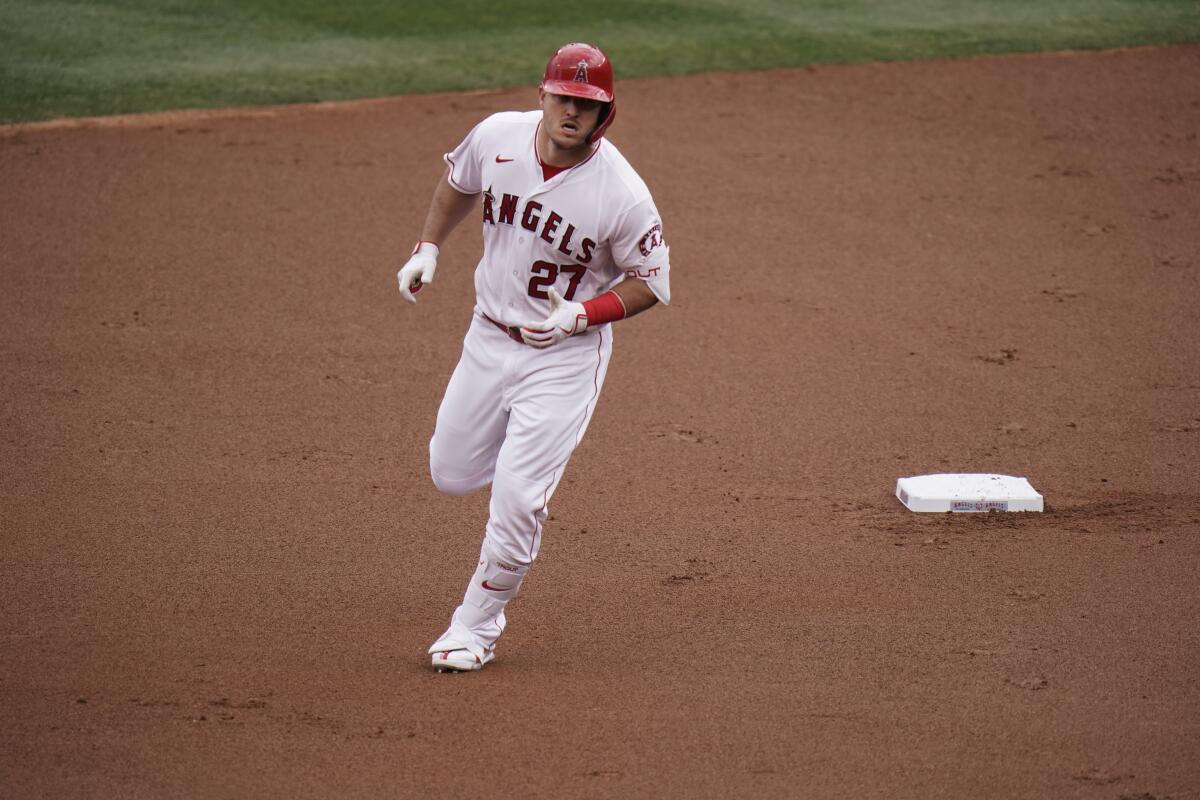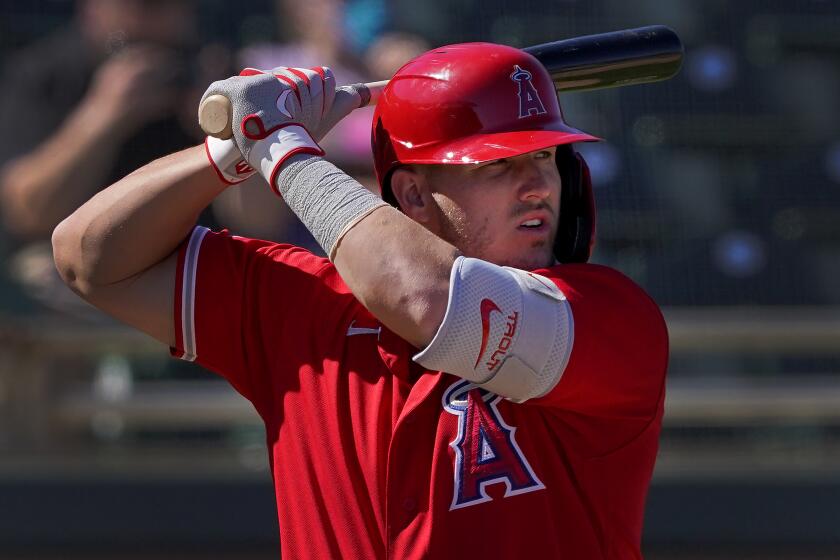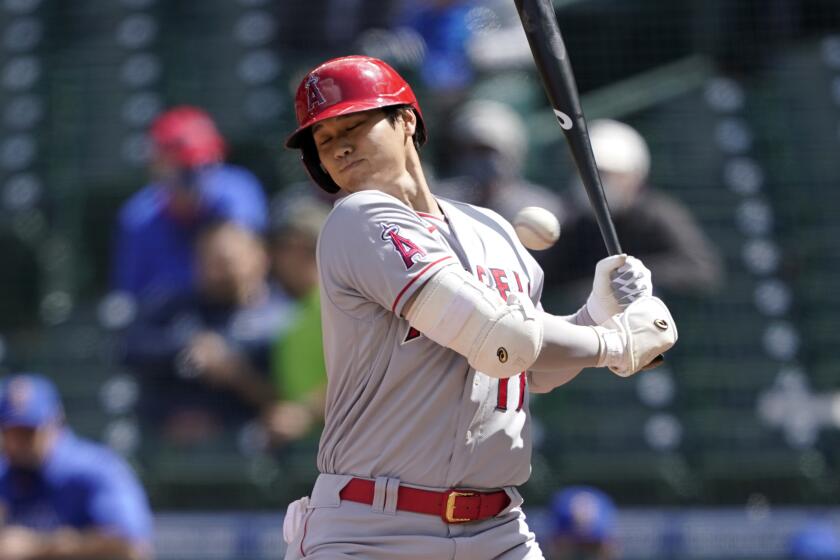Have a month, will ya? Angels’ Mike Trout might be better than ever

The man at the plate was easily recognizable.
The backward hat and powerful build. The spring-loaded stance, hips cocked and bat swiveling near his head. The lightning-quick swing, from leg kick to two-handed finish, sending a stream of balls from a pitching machine scattered around an empty field.
For the better part of 30 minutes during a pregame hitting session in early April, Mike Trout took purposeful swing after purposeful swing. Between each rep, he consulted with hitting coaches and reviewed a digital tablet. He joked around during breaks, a laughter that echoed around an otherwise quiet Angel Stadium. But when he returned to the batter’s box, he instantly locked in again.
More than 1,250 games into what is already one of baseball’s most storied careers, the sport’s best player was trying to become even better.
Based on the start to his 11th major league season, there are signs the Angels outfielder might actually be doing it.
Trout entered Saturday’s game, in which he homered in the first inning, coming off an April performance that was the best month of his career and one of the most dominant 30-day stretches by any player in recent history.
Mike Trout’s contract with Topps trading cards isn’t as big as his Angels deal, but it’s a significant investment in a player once deemed unmarketable.
His traditional numbers were off the charts: a .425 batting average, .523 on-base-percentage and .781 slugging percentage — a slash-line combination that hadn’t been achieved in any month since Lance Berkman in May 2008 — plus six home runs and 14 RBIs.
He led the majors in most advanced stats: an OPS of 1.304, a wRC+ (an all-encompassing statistic in which 100 is considered league average) of 263, and an even 2.0 wins above replacement according to Fangraphs’ calculation.
His underlying metrics backed it all up: According to MLB’s Statcast system, he ranked among the top 10% of all players in average exit velocity, hard hit and barrel percentage, and expected batting average and slugging percentage.
“You’re talking about somebody in a different galaxy,” Angels manager Joe Maddon said. “The standards for him are so high, it’s very difficult to maintain them constantly ... I guess the right word may be ‘pressure’ — he feels the pressure to at least be that, and he’s always trying to do more. He’s got this high standard to live up to, and he does.”
This season has not yet reached the quarter mark, but it already looks like Trout will contend for a fourth MVP award, a feat never accomplished in the American League. He’s been a leading catalyst for an Angels team that has hovered around .500 despite injuries and inconsistent starting pitching. And he is forcing the sport to reconsider his ceiling all over again.
“Is there even a better version of that? I mean, I have nothing to compare it to,” Maddon said. “But what I’m seeing right now is pretty darn good.”

::
Jeff Trout simply had a feeling.
There wasn’t anything obviously different about his son’s offseason this winter. No major changes in his six-days-a-week training program. No grand declarations about altering his game. Even their conversations were subtle.
But sometimes, a father just knows.
“I told a couple people, close friends of ours, that going into spring training I thought he was in really, really good condition,” Jeff Trout, a former minor league infielder himself, said this week by phone.
“He doesn’t say much about it, but I’m around him so much in the offseason that I could tell after the holidays, he just looked so good physically. He looked lean and strong. I’d ask him, ‘How you feeling?’ He’d say, ‘I’m starting to really feel good.’ Just to get a comment like that out of him tells me he’s happy where he’s at.”
Last season was somewhat of a struggle for Trout, at least by his atmospheric standards.
Eric Kay, the Angels’ former communications director, has pleaded not guilty to federal charges in Tyler Skaggs’ death.
He batted a career-low .281 (excluding his brief debut in 2011) and had a sub-.400 on-base percentage for the first time in six years. Though he hit 17 home runs in the shortened season, tied for fourth in the majors, and became the third outfielder in major league history to win an eighth Silver Slugger award, he felt like he was “cutting off my swing really bad,” he said this spring. “I was hitting everything on a label,” baseball speak for failing to square up a pitch on the sweet spot of the bat.
But when he returned home to New Jersey in the fall, he wasn’t discouraged. Just the opposite, actually, getting to enjoy his first offseason as a father.
“He’s real happy,” Jeff Trout said. “He’s happy being a dad. He’s happy with his home life. He’s always been comfortable about who he is. And then maturing over the years both physically and mentally, put that all together and you’re going to have a good year.”
‘He’s real happy. He’s happy being a dad. He’s happy with his home life. ... Put that all together and you’re going to have a good year.’
— Jeff Trout, on his son Mike
Trout spent the spring refining his swing. He practiced a drill also used by Shohei Ohtani to keep his body square and his bat on time. He worked on making his mechanics in the cage more similar to his stroke in the game.
His main objective was simple.
“For me, it’s just being on time, getting that foot down, not trying to do too much,” Trout said. “It all starts with getting that foot down. When it’s not down, I don’t recognize pitches, the chase rate goes up. Just being on time and recognizing pitches is big for me.”
It took most of Cactus League play for all the pieces to fall into place, but he’s been locked from the start of the regular season. He has reached safely in 21 of his first 22 games and recorded multiple hits on 11 occasions. After sitting out three days last week with an elbow contusion resulting from a hit-by-pitch, he returned to the lineup with a four-hit game Monday
“The guy does something special every day. Who takes three days off and comes back and gets four hits?” said Albert Pujols, a three-time MVP himself who has been teammates with him since Trout’s first full season in 2012.
“The work ethic he puts into it day in, day out — I get to see that. He doesn’t take anything for granted. For a young player like that, who has that kind of success, it’s really easy to shift a different direction and say ‘Hey, I got this figured out.’ Trout is different. He wants to get better every day. And that’s what’s scary.”
::

The conversation still sticks with José Mota, an exchange the Angels broadcaster had with a major league manager during spring training in 2015.
At the time, Trout was coming off his first MVP season, cementing himself as MLB’s premier player at only 23 years old.
“How about this Trout, huh?” Mota asked.
“Well,” the manager responded, “statistically, I don’t think he can get any better. What he’s done is way too much. How can he get better?”
Looking back now, the memory makes Mota laugh. In the seven seasons since, Trout has only escalated his play.
“[The manager’s] mentality was, ‘The league is not going to allow him to do that,’ ” Mota said. “But [Trout] doesn’t make mistakes, which is where big-time players make their money. I can have a game plan against Mike Trout, but executing that game plan takes perfection. And nobody’s perfect. So, the 1-and-0 pitch I want to throw low and away for strike one, all of a sudden it runs out over the plate and boom. It’s done. He doesn’t miss those things.”
In fact, he might only be getting better at capitalizing upon them.
Shohei Ohtani took a pitch off his elbow in the Angels’ 2-0 loss to the Mariners, and it’s unclear if he’ll make his next scheduled pitching start.
This season, Trout has been increasingly aggressive, taking noticeably fewer pitches than in the past. Overall, he is swinging 40.9% of the time, three points above his career average. He has a first-pitch swing-rate of 26%, almost double his rate from last season. And he is going after 64.2% of pitches in the zone, another personal high.
It has led to more whiffs, and in turn, a career-high 26.1% strikeout percentage. But that has been offset by an increase in power, with Trout crushing the ball harder and more consistently on contact than almost any other time in his career.
“The amount of hard contact he makes, the amount of hits he gets, it’s almost unparalleled,” said Mota, a former major league infielder who has been an Angels analyst for every season of Trout’s career. “It’s not like he over-tries. … His mental discipline and his mental aptitude in the batter’s box, I haven’t seen anything like it.”
Maddon described the ever-evolving approach as an example of Trout’s continued growth, a sign that the center fielder is “still maturing” as he nears his 30th birthday in August. Pujols concurred, noting how Trout continues to ask for advice on how to attack certain pitchers, always searching for any extra little edge.
“When he doesn’t have a good game or two, or his swing is a little off, he gets back to the drawing board, he works at it and tries to correct,” Jeff Trout echoed. “He’s never been the kind of kid who thought he knew everything.”
He is, however, the kind of player who now seems capable of almost anything.
A few years ago, Mota crossed paths with the same manager who once doubted Trout. This time, the coach had a much different answer: “He proved me wrong.”
And after a historic opening month this year, there’s no sign Trout will stop any time soon.
More to Read
Go beyond the scoreboard
Get the latest on L.A.'s teams in the daily Sports Report newsletter.
You may occasionally receive promotional content from the Los Angeles Times.










